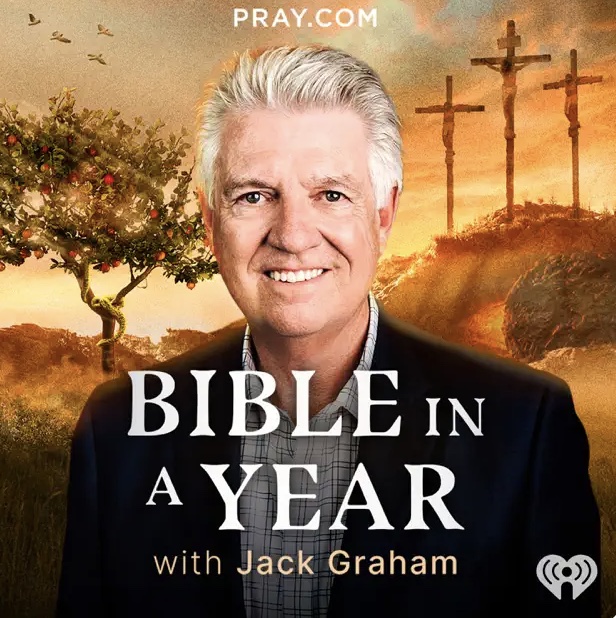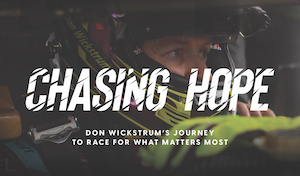There’s No Faith Too Small to Move Mountains: Maggi Thorne & Don Wickstrum

CONTENT WARNING: This episode contains mention of suicide.
Maggi Thorne: You have to persevere, and there’s a lot of overcoming and being able to stick with it and stick through. And ultimately, you have this moment, it’s a bit of a mountaintop moment where you’re just really grateful for all the hours and hard work and just the special moments.
There’s No Faith Too Small to Move Mountains: Maggi Thorne & Don Wickstrum – Episode #337
Narrator: Welcome to the Jesus Calling Podcast. When we think about life events that define our existence, what naturally comes to mind? Perhaps it’s finishing your education, or getting that first job, starting a family? Or maybe the tougher things come to mind, like facing an illness, losing a loved one, or struggling to make ends meet after a job has ended. There’s one common denominator in both the hard and joyful events of our lives—our faith. It’s in those defining life moments—even the ones where you crash and fall hard—that greatness, courage, and true purpose reveal themselves. That one act of taking the next small step on the way to our next big hurdle reminds us of how Jesus says, “All it takes is to have faith the size of a mustard seed, and mountains will move.” [Matthew 17:20]
Our guests this week have experienced the kinds of life events we’re talking about that make one take stock in who they are. From failing an obstacle course on national television to crashing a racecar on a winding track up a mountain, they’ve faced unusual challenges, but their stories don’t end in failure. Each of them chose to dust themselves off, take another small step of faith, and continue to do what they were meant to do. American Ninja Warrior Maggi Thorne shares how she battled with mild traumatic brain injury while racing up the infamous warped wall. She walks us through her decision to step away and heal and how she leaned on God to find the strength to never give up. Pastor and race car driver Don Wickstrum takes us on his path to racing to the clouds on a 12.42 mile intensive mountain course, amid a colon cancer diagnosis. He shares how he chose not to quit, but instead how he relied on God to make it to the finish line.
Let’s start with Maggi’s story.

Maggi: Hello, everyone. My name is Maggi Thorne. I am an American Ninja Warrior. I’ve been on the show for seven seasons in addition to Spartan Ultimate Team Challenge, Team Ninja Warrior. And when I’m not spending my time on American Ninja Warrior or obstacle courses taking on those obstacles, I’m taking on obstacles as a single mom of three incredible kids. One of them is actually a national champion in hurdles.
When I was growing up in San Diego, California, I was from a low-income home. We split our home with another family, and I didn’t know what it meant to dream. Both of my brothers were high school dropouts. They’re in and out of jail. One of them was in a gang. And I didn’t really see a future for myself, actually, or even know what that could possibly look like.
I remember at the age of twelve years old, I was reading the comics in the Sunday paper, and that was the first time I thought, Oh, I don’t feel joy, and I didn’t know what purpose or direction was. So in terms of leading to me where I am today, all of those experiences have actually led to my passion to serve the poor, the underprivileged, the underrepresented, and making sure my platform of American Ninja Warrior—what I feel like God has blessed me with—is used to advocate for them, and specifically speak into the life of youth and tell them you have opportunity, it’s not opposition, and anything is possible.
“[My] experiences have led to my passion to serve the poor, the underprivileged, the underrepresented, and making sure my platform of American Ninja Warrior—what I feel like God has blessed me with—is used to advocate for them.” – Maggi Thorne
Taking the Untraditional Road
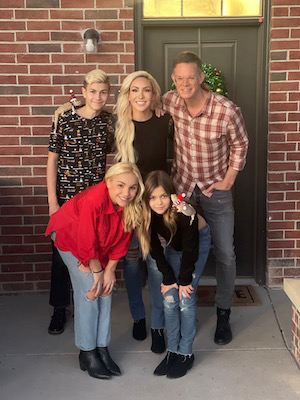
I became a professional athlete in my mid-thirties after having three kids because, you know because that’s what everybody does. It actually wasn’t a traditional road.
When I was growing up, we didn’t have money to play sports, so I actually was not an athlete until high school. There was a teacher who motivated me, inspired me, and is a part of that message of equipping, empowering, and encouraging me. Her name is Sandy Martinez, and she just saw something in me that I didn’t know how to see in myself. Even though I’m forty-one, she’s still an encourager in my life. And there’s a teacher who thought I looked fast in P.E., told the track team, and that led to someone advocating for me, speaking up for me, seeing something in me, and empowering me towards that. I ended up becoming the California state champion in the hurdles, which eventually led to a full ride at the University of Nebraska, and I became the first person in my family ever to get a collegiate degree. And so small actions can have big ripple effects.
After graduating from the University of Nebraska, I spent ten years managing multimillion-dollar construction projects, building stadiums and arenas. And over the course of that time, my brother had died by suicide, and then one of my best friends had died by suicide. And the day of her funeral, as I watched her casket go into the ground, that is when I feel like God spoke to me to not build buildings, but to build people.
I had started my career as a grounds crew worker, and ended up designing and managing the facilities I used to clean. And so I knew God had given me this role and responsibility and He can take this next path too. Because a lot of people, when I said, “I think I’m going to go out and build people and not buildings, and I’m going to quit,” they thought I was bananas and couldn’t quite understand it and told me I was ruining my life, and I’d never be successful again. But I really had faith and trust in God.
“I knew God had given me this role and responsibility, and He can take this next path too.” – Maggi Thorne
The American Ninja Warrior Experience
American Ninja Warrior is so different from what everybody thinks, because they’re like, “Oh my gosh, it must be really quick.” And it’s so exciting on set, but it is such a long, arduous night. But with that being said, it’s actually a really impactful environment. The friendships that we have, the closeness that we have, it is what you see on TV. We are that close, we are that connected. It’s really incredible to walk on the set. It’s a really long day, but I always come alive. That’s how God has made me, to get in tune with my nerves.
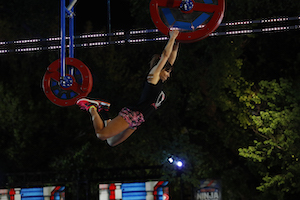
I really believe in discipline and THAT small habits add up to everything. We hear about that biblically. And I also understand THAT God has prepared me for this. And what that means is I’ve been committed to it in my habits and my focus and my discipline. But how I train has shown up in competition because you’re going to experience the unexpected, you’re going to experience failure. And how you’ve trained as a whole, that’s when it’s going to be there and show up.
“You’re going to experience the unexpected, and you’re going to experience failure. So how you’ve trained as a whole, that’s when it’s going to be there and show up.” – Maggi Thorne
My first year for American Ninja Warrior, I failed really hard—and they aired it. There’s nothing like having your failures aired on a global television network like NBC, but I knew it’s what I was meant to do and I continued to try. I actually got rejected the next two years I applied, even almost losing some friends who were just like, “I can’t believe this is what God has for you.”
Maggi’s Dream Is Interrupted
When I was on American Ninja Warrior, I ended up having a mild TBI, a mild traumatic brain injury. And what that means is I ended up spending a year in outpatient at a hospital called Madonna Rehabilitation Services in Lincoln, Nebraska. I did about twenty hours a week of outpatient work, and that was everything from speech, cognitive, physical therapy, occupational therapy, and vision therapy. Because that’s a rough journey, and I think it was actually one of the biggest blessings in my life to have a brain injury.
Now, how can someone say that? I had people say, “If God is a loving God, why would He do this?”
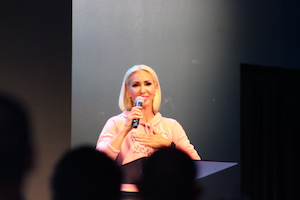
And I am the person that I go, “You know, what are some of my weaknesses? I go fast. I go hard. I’m always going.” And there’s all these prayers I’d had in journals for years asking God, “God, can you heal this?” I talked to God about coming to Him before Him at his feet. Well, I think He wanted to answer it, but I wouldn’t let Him. How stubborn can we be as humans, that we don’t slow down or stay distracted? And so He halted my entire life to the point that I had to say no to so many things. And I actually—for the first time in my life—ended up having to have EMDR therapy. It’s a trauma therapy that people had recommended to me over the years, and I’d never done it. I would say in my late thirties is when God really healed a lot of things that I had been asking Him for twenty years, even before I knew what prayer was.
And it just came full circle in my life that I could see, Oh, He is so loving. Like, it was an act of His love to slow me down, heal that part of my life, and really be able to have, I think, the best of my life to come yet. Here I am in my forties, and I’m so grateful, actually, for the injury.
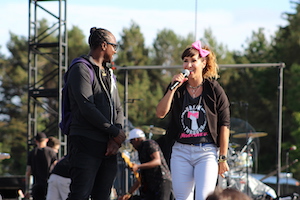
Because of the mild traumatic brain injury, the TBI, I actually ended up retiring from American Ninja Warrior. For the first six months of my recovery, I couldn’t feel the right side of my body. I couldn’t turn my head. They put me on so many severe restrictions. “You can’t work out. You can’t drive more than an hour. You can’t play catch even with your kids anymore.” I just couldn’t possibly see how I would ever not only compete on American Ninja Warrior again, but I would never be an athlete. I thought This is it. I’m done.
I was incredibly sad. You know, I was so used to being able to fix everything or work through an injury, and this was one that I couldn’t. It’s your brain, it’s not something you just fight through because it will fight you back.
And it wasn’t until I felt like I was just in this dark pit of despair, that feeling like I would never get better from my TBI. I was miserable, my eyes weren’t working right. I actually started to go blind, and it was when I started to go blind that God said, “Now that you can’t see, I need you to see. Let Me heal you.” And it was at that moment that [I realized], Okay, this isn’t about saying ‘never give up.’ It’s about becoming never give up. Can we become what we say? And what does that journey look like? And the first step was acceptance. I’m never going to be who I was again, but who can I be now and can I put that in God’s hands?
“[I realized], Okay, this isn’t about saying ‘never give up.’ It’s about becoming never give up.” – Maggi Thorne
And [from] that journey, I retired, God really started to speak to me through so many different people who would say—my daughter, actually, my youngest, she said, “Mommy, are you going to compete on American Ninja Warrior again?”
And I said, “Oh, no, baby girl.”
She goes, “Well, you tell everybody else never give up, and what are you doing?”
You know, first of all, great, she listens. Second of all, I was like, “Oh, well, I could get injured.”
And her response was, “And?”
I realized I wasn’t being led by faith, I was being led by fear. And I talked to all the doctors. I got cleared. I did a full evaluation of what are the risks and started to realize I’m actually an anomaly at the hospital.
And so approaching it with more caution and then more than anything, praying about it: God, do you want me to go back? And the interesting thing, despite all the restrictions I had during recovery, is I was not only as strong as ever, but in some ways stronger than ever. Now, how is that possible? If anybody’s an athlete, you know, if you take time off, you lose your muscle, your endurance, your strength. But I actually did it and I was like, “Okay, God, yes, I believe You got me to go back.” Prayed about it and made a comeback, and have returned as one of the top athletes on American Ninja Warrior, again, furthering the platform and being able to use that for the poor and underrepresented.
Called to Be Uncomfortable

I do believe God calls us to be uncomfortable, and that can be in conversation, in our community. Being able to step outside of our comfort zone, it doesn’t mean we necessarily have the sense of being fearless, but we have faith and we’re learning how to unleash our faith. And what does that look like? That’s stepping out, not knowing what’s ahead. It’s like walking through fog: you’re not certain what’s there, but you know something’s there.
I’ve realized over the years that no matter how hard I train, God’s already written my story. You know, that’s Ephesians 2:10, “For I am God’s workmanship, created in Christ Jesus to do good works, which He’s prepared in advance for me to do.” So if I believe that, I’m going to get on that course, I know that’s where I’m called and my story’s in His hand.
And maybe, you know, He’s launching a next journey through all these times you swung through the air, splashed in the water, or made it on top of the warped wall and had this buzzer moment, is that He’s going to continue to do that and use you in ways that you can’t even fathom.
Jesus Listens, July 19:
Ever-present God,
This is a time in my life when I must learn to let go—of loved ones, of possessions, of control. To let go of things that are precious to me, I need to rest in Your Presence, where I am complete. As I take time to bask in the Light of Your Love, I’m able to relax more fully. Then my grasping hand gradually opens up—releasing my prized possession into Your care.
You have been teaching me that it’s possible to feel secure even in the midst of the most difficult, painful circumstances— through staying aware of Your continual Presence with me. I rejoice that You are always with me and You never change. You are the same yesterday, today, and forever! As I release more and more things into Your care, I’m blessed by Your assurance that You never let go of my hand. I love to hear You speaking to me through Your Word, “I am the Lord your God who takes hold of your right hand and says to you, Do not fear; I will help you.” Thank You for being my firm, secure foundation that no one and no circumstance can take away from me.
In Your steadfast, loving Name, Jesus,
Amen
Narrator: To learn more about Maggi and her journey, please visit www.maggithorne.com.
Stay tuned to Don Wickstrum’s story after a brief message.
Follow the Bible in a year with Jack Graham!
Begin your New Year’s Resolution with the Bible, and see why millions have already started Bible in a Year with Jack Graham. This podcast was created to help you solidify your faith as you experience the story of the Bible through live-action recordings and emotional, orchestral music.
Listen to Bible in a Year with Jack Graham on the iHeart Radio app, the Apple Podcasts app, or wherever you get your podcasts.
Narrator: Our next guest is Don Wickstrum, who’s tackled his biggest dream—racing a car up a dangerous mountain—while battling a colon cancer diagnosis that only gave him a year to live. Don shares with us how he went from living a life without hope to sharing the gospel and chasing after hope for other people.
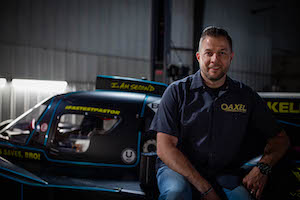
Don Wickstrum: My name is Don Wickstrum. I’m a pastor, entrepreneur, and racecar driver.
My childhood was a typical Midwestern childhood. My family moved around. Both my parents came from broken homes. And when I was younger, my mom and dad had invested everything into a business to go help my aunt start one. And after some time, there was a fall out, and my parents left the hill. We were homeless for a little while there. We got to a point where we finally found a house.
Growing up, I felt loved. My parents worked really hard to get us out of the situations we were in, and just to make a living. I know for my parents, as hard as they tried, my life was probably pretty threaded with a lot of hopelessness. But cars became a passion for me.
Pursuing a Dream, Discovering Faith
When I was young, I had a dream of being a racecar driver. I wanted to go all around the country and just drive cars. I didn’t care necessarily what it was. I really liked NASCAR at that time. I bought my first car at ten and a half, and I worked on cars all the time.
When I was eight years old, I remember seeing this Bobby Unser special on TV with my cousin. And I remember just telling him, “One day I’m going to do that. One day I’m going to race Pikes Peak,” this beautiful, majestic mountain in a car.
What inspired me about the Pikes Peak Race was that it was a race that wasn’t necessarily against other competitors, because you’re sending one car up at a time. You’ve got this race that’s deemed the deadliest race in the world, one of the most dangerous races ever thought of, I think. And you’ve got this beautiful mountain, and we always think of people hiking up it. But here they’re taking a car. And I thought, Man, this beautiful scene, and cars, and you combine them together with treachery and danger. That sounded like my kind of thing. And so I really want to do that. It just was a place where all the great racers went. If you could swing a car up Pikes Peak, that meant you really were a racer.
I went and tried out for an amateur race team, and they accepted me. I began to tell my dad about that, and my dad just said, “You know, in racing, you can’t have a family. Maybe you want to go to college first.” So I made a deal with my dad. I’m like, “I’ll apply to one school, and if it accepts me, I’ll use some of that race car money I’d saved up and I’ll go to college.”
The next thing I know, I was at the University of Platteville, and I had selected engineering because I had the word engine in it. So here I am, the one thing I really dreamed of doing, I left behind and started on a new path which I hadn’t even had on my radar. And little did I know that that path would begin me on the road of discovering Jesus.
Don’s Newfound Hope
One of the good byproducts of going to college and almost failing out was that at college, I got to observe a lot of different religions at work. I looked all around them, and I became an atheist and started really just looking at all these different religions and saying, Man, they’re just all hypocrites, whether they’re Islamic or Buddhist or Christian or whatever it may be. I just felt like they’re all hypocritical. So I thought, I’m going to show all these people how dumb their religions are and disprove them all. So I took a historical accuracy and forensics take on it.
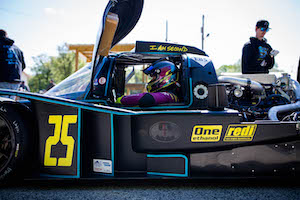
I got to Christianity and thought, Boy, this is going to be really easy. And a year and a half later, I found myself just more angry and more frustrated because every turn of the way, I couldn’t disprove the Bible.
Unfortunately, the cost of it started becoming too weighty for me once you know the truth. And the hopelessness that I would feel at night, this empty, empty feeling, you know—in the world’s eyes, I was successful at this point. I had a career as an engineer. I was full time working, full time school, moving my way up the corporate ladder very fast. But I was just so hopeless. And finally, one night at work, I realized like, Man, I know it’s going to cost me a lot, but not turning to Jesus is going to cost me even more for a lot longer. And so I hit my knees in the middle of that production floor in a forklift aisle, and I began to pour out my heart to God.
“I hit my knees in the middle of that production floor in a forklift aisle, and I began to pour out my heart to God.” – Don Wickstrum
I remember just pouring out all my sins. I didn’t have this huge, like, weight lifted off of me and this great transformation like some people have. But what I did have, as I realized sometime just a little bit later, I had this newfound hope, a hope I’d never experienced before.
Letting Go to Fully Live
Me and my wife owned a robotics integration firm. And here at like the sixteen-year mark, this cancer diagnosis comes. So there I am, flying down to see my doctor because I knew something was wrong. I wasn’t sure what, and I didn’t expect it to be cancer.
There I am, I’ve got this diagnosis. My doctor tells me, “If you have any chance of kicking this cancer, you have to sell that business. You won’t be able to endure this process and still have that business.” And so here I am at the pinnacle of my career. I think the very next thought wasn’t how I was going to beat cancer, it was more like What? I just finally felt like I arrived. This is what we worked so hard for. And the first place I went was, How do I preserve the business?
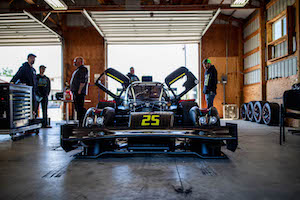
And so at what should be the happiest point of my career, I’m depressed because I’ve got to let go of something that I poured my whole life into. For me, it was a lot of examination, like, Was it worth it? Was all those sleepless nights and time away from my kids and my family and my friends and the moments I missed? Was it really worth it to grow this business and then come to this point?
I think there was a grieving process—not for the cancer per se, but for a business, if that makes any sense. This thing I had put my heart and soul into that came at a cost to my health and my family and my friends and even sometimes my church. And so I think that was all stuff that was running through my head and things I had to come to terms with.
And you begin then to realize, Okay, well, now that I’ve got that hurdle out of the way, now I can turn my attention to cancer? And what does that mean for my life? Then all of a sudden, you start thinking about the brevity of life and, What does it look like if I’m not here in a year?
Chasing a Forgotten Dream
Shortly after my diagnosis, a friend of mine had heard about it. He says, “Listen, Don, man, you’ve helped me out. You have helped a lot of people. I would love to help you accomplish something on your bucket list. What would it be?”
And I just kind of blurted out “Pikes Peak!”
I hadn’t given Pikes Peak a ton of thought at the time, because that was a dream that I had let go. You know, just adulthood happens, God’s calling happens, and you just think those things are no longer. I started praying about it and really felt like God was calling me there, but I couldn’t figure out why. We don’t always get all the pieces of the puzzle, but it was just a little unsettling for me. I’m like, “I don’t see how in the midst of a cancer battle, me not having much time to live possibly, to take time and energy to do this Pikes Peak thing,” because I knew it would take a toll on my health. You know, training for it, getting ready for it. And it would take time away from my family.
I began to realize that I didn’t need to know the ending of the story. I just needed to tell it and where I was at because it would speak to someone. So we applied. And for whatever reason, God saw fit that they would accept me into Pikes Peak. And so off we went to try to live this dream before my expiration date came up.
“I began to realize that I didn’t need to know the ending of the story. I just needed to tell it and where I was because it would speak to someone.” – Don Wickstrum
That first morning when we fired up the car, I just remember sitting there with a heart of gratitude, like, God, of all the things that I could have thought my life could be, I would have never thought I’d been here. I was just reminded of His faithfulness—not because I was able to live a dream, but because in the midst of a nightmare diagnosis, I had peace and I had hope.
I’m just excited. We go out, and we were doing fairly well. And we got the full practice week, and I crashed. I was so devastated. I’d hit some ice and slid on the side of the mountain, and I was just so devastated. I just remember saying, “God, You brought me to this point just to humiliate me. Is this what this is about? Just to crash, not to live the dream?”
We came back the next year. I was still alive. I’m even more grateful to be there because I’m like, Man, I’m beating the odds. And I crashed the second year, because I thought I could find a better way around the mountain. And I couldn’t.
We applied yet a third year. I was still alive. I felt like God was still calling us to go back. I don’t know that I was really keen on it after this crash, but after praying about it, me and my wife, we both were like, “Yeah, we need to do it now.”
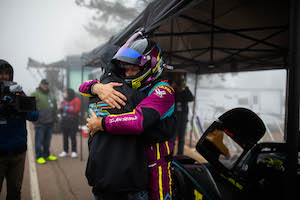
So we went and we finished the race, but it wasn’t to the summit. It had gotten shortened because of ice. And so I thought that was going to be it. I thought that would be it. And then lo and behold, we felt called back again in 2022. And God just put this team together, remarkable people, and we went up. And not only did we have a great month of ministry and reaching people with the gospel, but we also had a great month of accomplishing a dream to the summit.
Just to finish the race was incredible. To have so much failure and then finally you’re able to finish it, I just sat there and thanked God. It really was this moment where when I crossed the finish line, all these memories came just flooding back of all these trials and tribulations and everything I’d been through and my family’s been through and what I put them through. And I just felt this peace, this overwhelming peace of God.
I realized, like, through this whole thing, it just built more and more hope in my life. And so it was an absolutely incredible moment for me of just realizing God’s faithfulness and the fact that He didn’t rescue me from the adversity. He gave me the power and strength to endure them so that I could have a character built up in hope.
“It was an absolutely incredible moment for me of just realizing God’s faithfulness and the fact that He didn’t rescue me from the adversity. He gave me the power and strength to endure them so that I could have a character built up in hope.” – Don Wickstrum
Giving People a Reason to Believe There’s Hope
It’s just an awesome testimony to what God’s done in my life and how He continues to use me, and so we’re going back. And what’s interesting to me is I think the big thing in this whole story is seeing God work in people’s lives and be able to encourage people. And that is going to be the crux of what we’re ministering to people, is there is still hope. There’s still hope for you for your purpose. There’s still hope for you to be reconciled through Jesus Christ. There is still hope for you to live another day fulfilling the will of God.
“There’s still hope for you for your purpose. There’s still hope for you to be reconciled through Jesus Christ. There is still hope for you to live another day fulfilling the will of God.” – Don Wickstrum
The biggest attribute to my walk has been daily devotionals, daily prayer, and daily reading the Bible. Those three things make for a great foundation to be able to weather any storm coming. And the reason being is scripture is life-giving. It doesn’t suck life away from you. It’s life-giving. And it’s what brings peace, joy, and hope.
Jesus Listens, March 23:
Victorious Lord Jesus,
Help me rejoice in my sufferings—really believing that suffering produces perseverance, perseverance produces character, and character produces hope. It’s so encouraging to know that pain and problems can actually be blessings—increasing my hope. I realize, though, that this doesn’t happen automatically. I need to cooperate with Your Spirit as He guides me through times of suffering. Perseverance is such a rare quality these days. Like most people, I look for and long for a quick fix. But You’ve been showing me through Your Word that lengthy adversity—accepted with trust and confidence in You—transforms my character, making me more like You.
My closeness to You also helps me cope with problems—trusting that You and I together can handle them.
In Your glorious Name,
Amen
Narrator: To learn more about Don Wickstrum and his documentary, Chasing Hope, visit www.iamsecond.com.
If you’d like to hear more stories about taking the steps to never give up, check out our interview with Todd Hoffman.
Next Week: Chris Tomlin
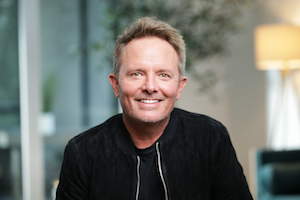
Narrator: Next time on the Jesus Calling Podcast, we’ll hear from the brand-new host of Jesus Calling: Stories of Faith, airing on UPTV: legendary worship leader Chris Tomlin. As the GRAMMY-winning singer/songwriter of top songs like “How Great Is Our God,” and “Good Good Father,” Chris’s desire is to show up as more than just a performer on stage, but as a conduit to connect people to a real relationship with God.
Chris Tomlin: I think for me, it’s always been about trying to help people connect to God in music. Even from a young kid, I just wanted people to worship God, and I didn’t even know what all that meant. But I’ve always tried to write songs that people worship God to and write about those kinds of simple songs. I never would have dreamed it would have taken me to places it has taken me. But I’m so grateful for it.
